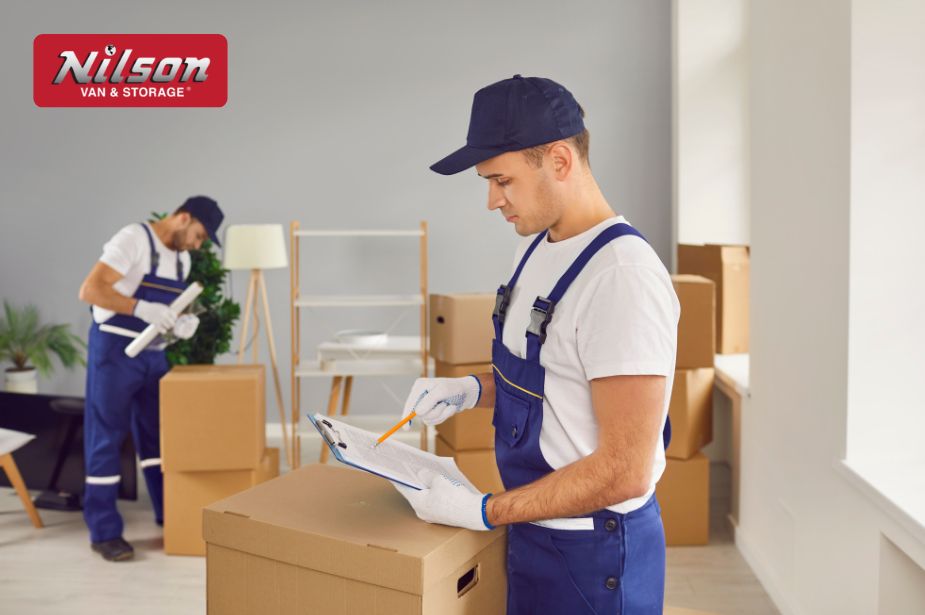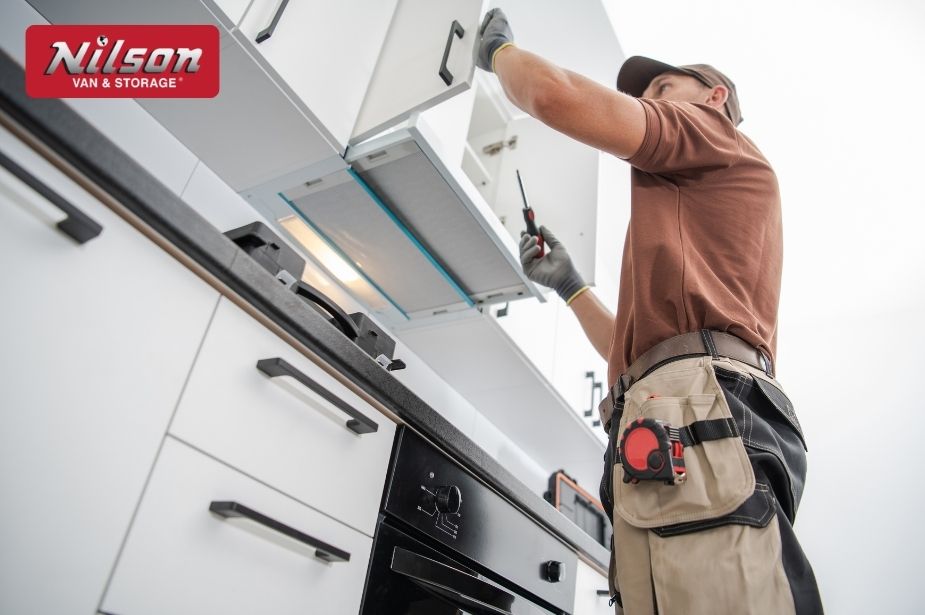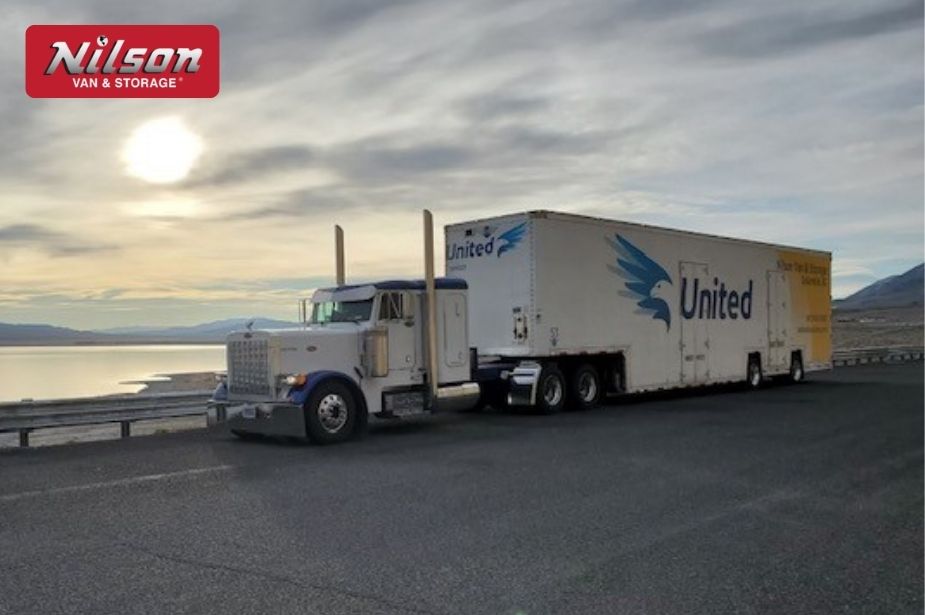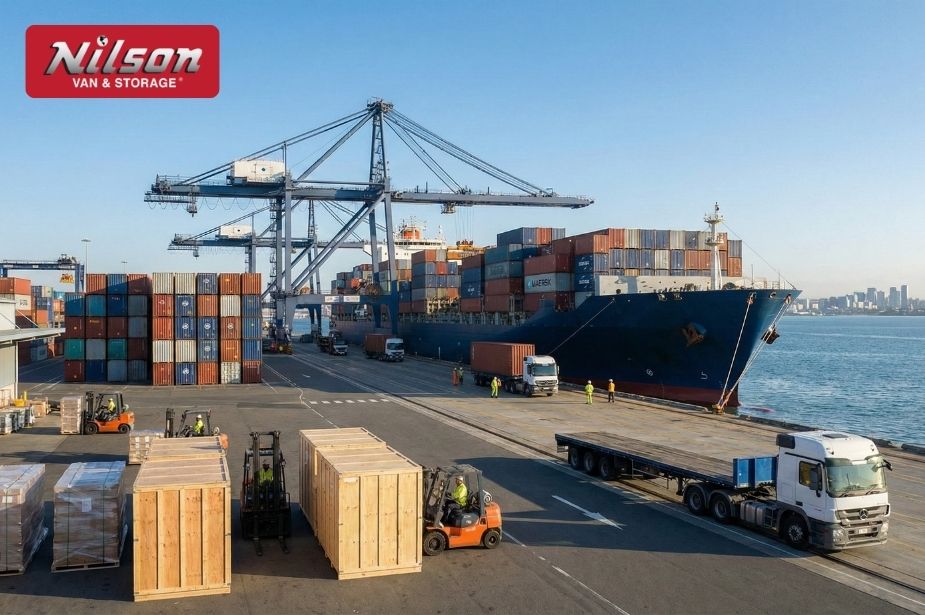
Do NOT Pack These 4 Dangerous Items During a Move
Moving to a new home or office in Columbia, Myrtle Beach, Charleston, Sumter, or Savannah brings a fresh chapter filled with opportunity and promise. Yet, amidst the excitement, it’s vital to prioritize safety to ensure your relocation goes smoothly. One of the biggest challenges in any move is knowing exactly what to pack—and equally important, what to leave behind. Dangerous items during a move can create significant hazards, from fire risks to chemical exposure, not to mention possible legal complications. These aren’t just theoretical concerns; moving companies nationwide, including Nilson Van and Storage, have strict policies about prohibited moving items to protect clients, their crews, and property.
At Nilson Van and Storage, we understand how overwhelming packing can be, and we’re committed to helping you avoid pitfalls related to hazardous materials during a move. Our experienced team works closely with customers across the Southeast to provide transparent guidance on what items movers won’t move under any circumstances. This proactive approach minimizes surprises on moving day and helps maintain a safe environment for everyone involved. In addition, we offer clear communication about our valuation coverage, so you know your belongings are protected without the confusion of insurance jargon.
Plus, our non-binding moving agreements for South Carolina locals and no cancellation fee policy offer peace of mind during your transition. With so many moving parts, it pays to be informed—especially when considering the dangerous items you should never pack yourself.
In this article, we’ll uncover the four most common types of dangerous goods that are off-limits during your move. These are items that, if handled improperly, could lead to accidents, regulatory violations, or even delays. Beyond simply listing what not to pack, we’ll share useful moving safety tips and introduce a dangerous goods checklist to help you plan smarter. Whether you’re relocating within South Carolina or heading to Savannah, Nilson Van and Storage is your trusted partner for a move that’s both efficient and secure. Avoiding these dangerous items from the start ensures your moving day stays on track and stress-free.
Why You Need to Know About Dangerous Items During a Move
Understanding the Risks
When preparing for a move, it’s essential to recognize that not all belongings are safe to transport. Some items are classified as dangerous during a move because they pose serious risks to people, property, and the environment. These dangers can range from fire and explosions to chemical exposure and contamination.
For example, flammable liquids like gasoline or propane can ignite or explode if not handled appropriately. Corrosive chemicals and toxic substances can leak, causing damage to other belongings and posing health hazards. Even seemingly harmless household items, when combined or improperly packed, may create fumes or chemical reactions that endanger the move. Understanding these risks is the first step toward protecting yourself, your possessions, and the movers entrusted with your belongings.
Overview of Prohibited Moving Items
The moving industry has long-established guidelines on prohibited moving items designed to reduce these risks significantly. Prohibited moving items typically include flammable or explosive substances, chemicals classified as hazardous, perishable goods, and biohazardous materials. This broad category covers gasoline, fireworks, cleaning agents like bleach, pesticides, and even certain batteries or medical waste. These restrictions exist not only for safety but also to comply with local, state, and federal transportation regulations. Movers have legal obligations to refuse handling or transporting these materials due to liability and insurance limitations. Understanding what falls under prohibited moving items helps you plan your move responsibly and avoid last-minute surprises that could delay your relocation.
The Importance of Following a Dangerous Goods Checklist
One of the most effective moving safety tips is to use a dangerous goods checklist. Such a checklist ensures you systematically identify and exclude hazardous materials from your packing. This step reduces risks of accidental inclusion of banned substances in your moving boxes. A well-constructed checklist can cover common categories and items movers won’t move, providing clear guidance throughout the packing process. It helps maintain compliance with safety standards and guarantees smoother communication with your moving team. Whether you’re moving within South Carolina or heading to Savannah, this checklist becomes an essential tool to assure compliance with regulations, safeguard your belongings, and protect everyone involved in the move.
How Nilson Van and Storage Ensures Moving Safety
At Nilson Van and Storage, safety is a top priority in every move we handle, whether in Columbia, Myrtle Beach, Charleston, Sumter, or Savannah. Our team rigorously follows all regulations concerning hazardous materials during a move and clearly communicates which items are prohibited. This transparent policy protects both clients and our professional movers alike. We provide valuation protection—not insurance—offering peace of mind without hidden fees or surprises.
Additionally, our no cancellation fees and non-binding moving contracts for local South Carolina moves give clients flexibility and confidence as they plan their relocations. By combining expert knowledge, careful planning, and open communication, Nilson Van and Storage delivers moving services that put safety first while ensuring your items arrive intact and on time.
Four Dangerous Items During a Move You Should Never Pack Yourself
Flammable Liquids and Gases
Common Examples: Gasoline, Propane, Paint Thinners
Flammable liquids and gases are among the most restricted dangerous items during a move. Common household examples include gasoline stored in fuel cans, propane tanks for grills, paint thinners, and even aerosol sprays. These substances are highly volatile and can ignite with a simple spark or temperature change. Due to their combustibility, moving companies uniformly classify them as prohibited moving items to avoid the possibility of fires or explosions during transit. Attempting to pack or ship these items yourself places not only your belongings but also the moving crew and equipment at risk.
Potential Dangers
The primary hazards of transporting flammable liquids and gases include uncontrolled fires and explosions. Even small quantities can create volatile environments inside moving trucks, especially if containers leak or are exposed to heat or friction. In addition to fire hazards, some flammable liquids give off harmful fumes that may cause respiratory issues or impair handling safety. Given these risks, transporting these materials requires specialized equipment and adherence to strict safety protocols that standard household moves cannot satisfy.
Recommended Alternatives
Rather than attempting to move flammable liquids and gases yourself, safely dispose of any excess materials ahead of time. Many local municipalities across Columbia, Myrtle Beach, Charleston, Sumter, and Savannah offer hazardous waste collection days or facilities designed to accept these substances. Alternatively, if you need to transport essential items like propane tanks, specialized shipping services or local retailers may provide safe exchange or transport solutions. Consulting Nilson Van and Storage before your move ensures clear guidance on what can and cannot travel with your household belongings, helping you avoid complications.
Explosives and Ammunition
What Constitutes Explosives
Explosives and ammunition are a well-known category of dangerous goods prohibited in nearly every household move. This group includes fireworks, gunpowder, ammunition, military-grade explosives, and blasting caps. Although some items may seem harmless at first glance—like small fireworks—they carry inherent risks due to their potential to detonate unexpectedly. Under federal and state regulations, these materials are closely controlled to prevent accidents that can result in injury, property damage, or legal consequences.
Why Movers Won’t Move These Items
Movers, including Nilson Van and Storage, will not handle explosives or ammunition due to strict legal restrictions and safety concerns. Transporting explosives outside of licensed carriers is illegal in most cases, and moving companies cannot accept liability for these hazardous materials. Handling explosives requires specialized training, permits, and vehicles equipped for safe containment and emergency response. By refusing to move these items, professional movers protect all parties and maintain compliance with transportation laws.
Safe Storage and Disposal Options
If you own fireworks or ammunition that must be relocated, consult with local law enforcement or licensed hazardous materials disposal facilities for safe options. Some jurisdictions offer scheduled disposal programs or recommendations for licensed carriers who can legally transport these goods. Never attempt to transport explosives with a household move or store them in a typical moving container. This precaution safeguards your move and keeps your new home or office safe from potential hazards.
Hazardous Chemicals and Cleaning Agents
Examples: Bleach, Pesticides, Acids
Household chemicals like bleach, pesticides, acids, drain cleaners, and other potent cleaning agents fall under hazardous materials during a move due to their toxicity and potential to cause chemical burns, respiratory irritation, or environmental harm if spilled. Even small amounts can be corrosive or generate toxic vapors. Movers categorize these substances as prohibited moving items because handling and transporting them safely exceeds the scope of standard moving practices.
Restrictions During Moves
Most professional moving companies, including Nilson Van and Storage, have firm policies disallowing hazardous chemicals in customer shipments. These materials expose movers to health risks and endanger all cargo in the vehicle. Furthermore, any leakage can render other belongings unusable or require costly cleanup. To mitigate these dangers, movers clearly communicate these restrictions upfront, and proper labeling or disclosure is crucial if you have any questions.
How to Handle and Dispose Properly
Plan ahead to use up, dispose of, or safely transfer hazardous chemicals before your move. Local household hazardous waste programs in Columbia, Myrtle Beach, Charleston, Sumter, and Savannah typically accept many cleaning agents, pesticides, and acids. Alternatively, purchase fresh supplies after your move instead of transporting old or partly used chemicals. Following moving safety tips like consulting your moving company and avoiding questionable materials ensures a smoother, safer relocation.
Perishable and Biohazardous Materials
What Counts: Food, Plants, Medical Waste
Perishable items such as fresh food, certain plants, and any biohazardous materials like medical waste are generally excluded from household moves. These materials can spoil, decay, or harbor bacteria and mold, causing odors, contamination, or health risks during transport. Although some movers may allow small quantities of non-perishable food, widespread industry standards consider large amounts or medical biohazards prohibited moving items.
Risks of Spoilage and Contamination
Spoiled food and decomposing plants produce unpleasant odors and attract pests, creating a hazardous environment inside moving vans. Medical waste or biohazards pose added danger by potentially exposing movers and client belongings to infectious agents or toxic substances. These health and safety concerns lead professional movers to refuse handling such items.
Alternatives for Transport
Consider using local storage options or specialized carriers for plants and perishable goods when relocating. Similarly, medical waste requires disposal through licensed biohazard handlers or healthcare facilities. If you plan to transport perishables personally, do so in insulated containers and limit transport time to minimize spoilage. Nilson Van and Storage can assist in planning your move around these restrictions, so your move remains safe and compliant without introducing unexpected hazards.
Read also: Protecting Your Documents Before Your Move
How to Identify Items Movers Won’t Move and Stay Compliant
Reading Moving Company Policies
A great starting point in preventing issues with dangerous items during a move is carefully reviewing the moving company’s policies. Most reputable movers, including Nilson Van and Storage, provide clear and detailed information on prohibited moving items in their contracts and on their websites. These policies outline exactly which hazardous materials during a move are not accepted, helping you avoid accidentally packing restricted goods. When reviewing these documents, look specifically for lists or sections labeled “prohibited items” or “items movers won’t move.” Understanding these restrictions early on gives you a realistic sense of what must be handled differently, empowering you to plan your move responsibly and stay compliant with local and federal regulations.
Communicating With Your Moving Team
Effective communication with your moving team is essential when it comes to managing dangerous items during a move. Informing Nilson Van and Storage ahead of time about any questionable or unusual belongings allows our professionals to advise you on safe handling and legal limitations. Early disclosure helps prevent last-minute surprises that could delay or complicate your move. Moreover, this open dialogue contributes to a smoother moving day by enabling your movers to prepare the right equipment, take necessary precautions, and comply fully with safety standards. Transparency with your moving team establishes trust, ensuring that both your belongings and the crew remain safe throughout the process.
Creating a Personalized Dangerous Goods Checklist
One of the smartest moving safety tips is developing a personalized dangerous goods checklist tailored to your specific relocation. Start by listing known hazardous materials in your home or office, then cross-reference these against the prohibited moving items stated by your mover, including Nilson Van and Storage. This checklist should cover common categories such as flammable liquids, explosives, hazardous chemicals, and perishables, but also consider any unique or specialized items you may have. Maintaining this list as you pack helps you systematically separate dangerous goods from safe-to-move belongings. It also serves as a reference to consult with your moving company, preventing accidental inclusion of restricted materials that could jeopardize your move’s success.
Tips for Packing Safely Around Restricted Items
While prohibited items must be excluded, safely packing the rest of your belongings is equally important to prevent accidents during transit. Use sturdy, high-quality packing materials and avoid overpacking boxes to reduce the risk of crushing or spilling contents. Clearly label your boxes, especially those containing fragile or potentially sensitive items, to prevent mishandling. If you store or transport items adjacent to restricted goods (such as cleaning supplies near flammable containers you’ve disclosed), ensure they are packed in sealed, leak-proof containers, and separated as much as possible.
Following these moving safety tips guards against incidental accidents and helps your movers handle your possessions efficiently. With Nilson Van and Storage’s expertise operating across Columbia, Myrtle Beach, Charleston, Sumter, and Savannah, our teams know how to manage your belongings carefully while adhering to safety and compliance standards. Remember, our valuation protection and no cancellation fees provide additional peace of mind, allowing you to focus on a secure and stress-free move.
Read Also: Pro Guide: How to Safely Pack Valuables Made Easy
Moving Safety Tips to Make Your Relocation Stress-Free and Secure
Planning Ahead for Hazardous Items
Successful and safe moves start with thorough planning—especially when it comes to hazardous materials during a move. Begin by identifying any potentially dangerous items in your home well in advance of moving day. This early assessment allows you to research proper disposal or alternative transport options, ensuring you don’t inadvertently pack prohibited moving items. Taking inventory of hazardous materials early also gives you time to communicate with Nilson Van and Storage about any special considerations, preventing last-minute delays or complications. Proactive planning is one of the most effective moving safety tips for keeping your relocation process smooth and accident-free.
Proper Labeling and Documentation
Clear labeling and detailed documentation are crucial tools in maintaining moving safety and compliance. When you separate hazardous materials you need to dispose of or relocate via specialized services, labeling helps everyone involved understand what’s inside each container. For safe-to-move belongings, properly marked boxes indicating fragile contents or special handling instructions reduce the risk of damage or accidents. Nilson Van and Storage encourages customers to maintain accurate records of their inventory and communicate any concerns regarding contents. This transparency enables professional movers across Columbia, Myrtle Beach, Charleston, Sumter, and Savannah to handle your shipment confidently and responsibly, aligning with all safety protocols.
Hiring Professional Movers in Columbia, Myrtle Beach, Charleston, Sumter, and Savannah
Entrusting your move to experienced professionals offers peace of mind when dealing with potentially hazardous materials and complicated logistics. At Nilson Van and Storage, trusted movers in Columbia, our team is highly trained in safe transport and handling practices tailored to local and regional moves. We understand the complexities surrounding dangerous items during a move and work closely with clients to ensure compliance with regulations. Our commitment extends to offering valuation protection—not traditional insurance—providing clarity and coverage without fine print confusion. Additionally, South Carolina locals benefit from non-binding moves and no cancellation fees, reflecting our dedication to customer flexibility and satisfaction.
Emergency Preparedness During Your Move
Even with careful planning, unexpected situations can arise on moving day. Establishing an emergency preparedness plan is an important moving safety tip to mitigate risks. Keep fire extinguishers and first aid kits accessible, and have contact information for local emergency services handy. When working with Nilson Van and Storage, our professional crews are trained to handle emergencies swiftly and efficiently, prioritizing safety for your belongings and everyone involved. Preparing a clear communication channel for all participants on moving day ensures rapid response if hazards related to dangerous goods or other issues occur.
Insurance and Liability Considerations
Understanding how valuation protection works in relation to hazardous or prohibited moving items is crucial. It’s important to know that most movers, including Nilson Van and Storage, cannot offer insurance coverage for dangerous or restricted goods. Instead, valuation protection offers a pre-determined coverage limit based on the value declared for your movable possessions. Since prohibited or hazardous materials are excluded from coverage, avoiding these items altogether preserves your protection benefits and minimizes liability risks. Clarifying these aspects during planning and packing prevents confusion and safeguards your move’s financial and legal integrity.
Wrapping Up
Moving safely means understanding exactly which dangerous items during a move you should never try to pack yourself. Steering clear of flammable liquids, explosives, hazardous chemicals, and perishables protects not only your belongings but also the health and safety of everyone involved—from professional movers to your family. These items are often classified as prohibited moving items, and their presence can jeopardize your entire relocation.
At Nilson Van and Storage, we proudly serve communities in Columbia, Myrtle Beach, Charleston, Sumter, and Savannah with unwavering commitment to high safety standards and clear, honest communication. We work closely with you to identify potential hazardous materials before your move, helping you navigate the dangerous goods checklist and avoid unnecessary risks. Our non-binding contracts for South Carolina locals, no cancellation fees, and straightforward valuation protection ensure your move is flexible, transparent, and worry-free. By following essential moving safety tips and entrusting your relocation to experienced professionals, you set the foundation for a smooth, secure transition to your new home or office. Choose Nilson Van and Storage to handle your next move with the care and expertise you deserve.

FAQs - Dangerous Items During a Move
Our Recent Articles
Stay informed and inspired with the latest tips, insights, and updates from the Nilson Van and Storage blog. From expert packing advice and moving checklists to stories about our commitment to the community, our articles are here to make your relocation journey smoother and stress-free. Explore our recent posts to discover how we’re redefining the moving experience for Columbia, Myrtle Beach, Charleston, Sumter, Savannah, and beyond.

How FFE Installation in Savannah Ensures a Seamless Setup

Complete Guide to Moving to Tennessee from South Carolina

